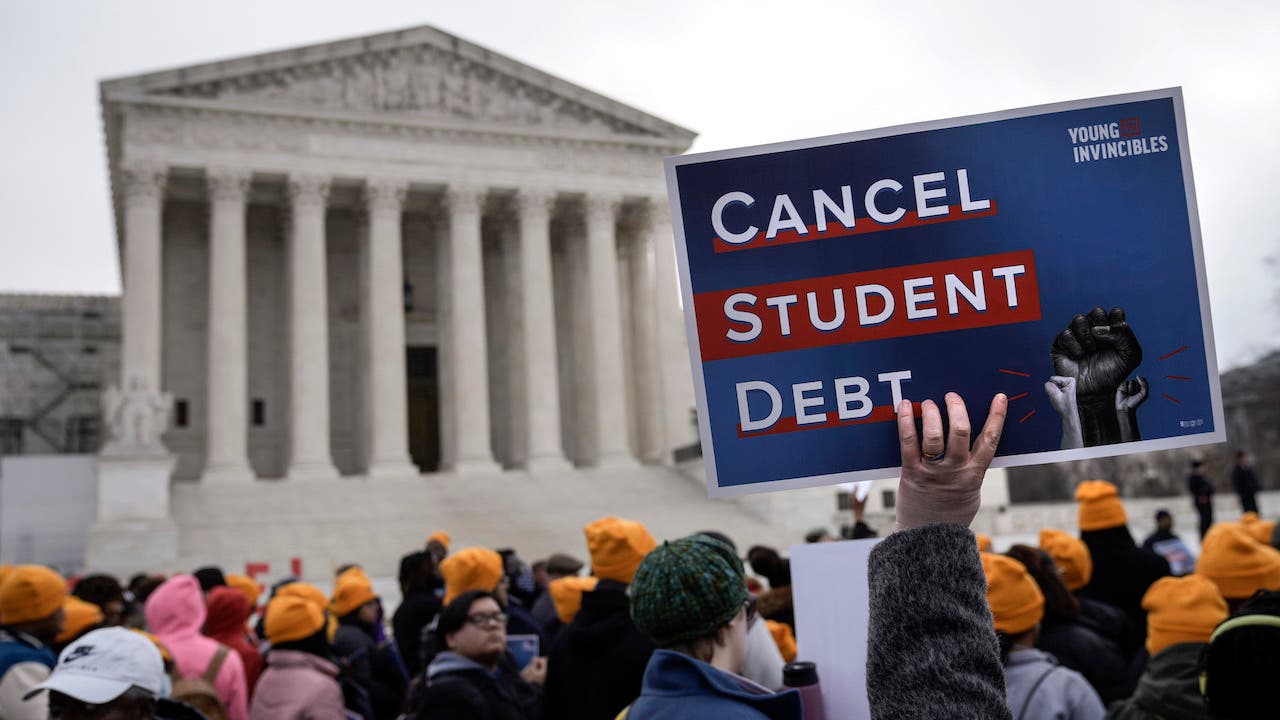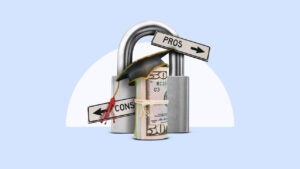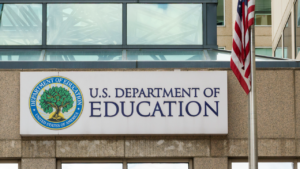Appeals judge rules student loan payment cuts can proceed, and other student loans news

In the news
In late June, two federal judges placed temporary injunctions on forgiveness through the Saving on A Valuable Education (SAVE) repayment plan following the U.S. Department of Education’s announced changes last week. However, a July 1 appeals court decision means planned payment reductions can proceed.
Plus, former president Donald Trump criticized President Joe Biden’s student loan forgiveness plans at one of his rallies in June. He stated that these relief efforts lacked legal backing, suggesting he may overturn them if he takes office.
Interest forgiveness on hold as SAVE Plan undergoes litigation
The Biden administration announced adjustments to the SAVE Plan in April and June that would have — and still may — bring millions of borrowers closer to student loan forgiveness. However, in late June two federal judges blocked aspects of the plan.
In mid-June, the Department notified impacted borrowers of its plans to cut their monthly payments by up to half in some cases and pause payments in July while these changes went into effect.
The administration also has plans in motion to cancel additional debts through tweaks to the program. For example, in April the White House announced plans to “cancel up to $20,000 of the amount a borrower’s balance has grown due to unpaid interest on their loans after entering repayment, regardless of their income,” the official statement details.
But these plans were disrupted by two ongoing lawsuits brought by Republican attorneys general in multiple states. Stacey MacPhetres, senior director of education finance for EdAssist by Bright Horizons, points out that the rulings only impact parts of the plans.
On June 24, a Kansas judge paused the proposed payment changes. His ruling argued the Higher Education Act of 1965 fails to clearly authorize this type of expansion to repayment plans. The administration appealed.
MacPhetres explains that on July 1, the Denver-based 10th U.S. Circuit Court of Appeals allowed the Education Department to reduce payments while the administration pursues an appeal.
“So borrowers currently enrolled in the SAVE program will see a reduced payment,” she says.
Also on June 24, a Missouri judge declared it unlawful to forgive any loans under the SAVE Plan, as it would negatively affect state-owned federal student loan servicers. Due to this ruling, forgiveness under the plan is currently halted until the case is settled.
The appeals process in both cases is ongoing.
What this means for borrowers
Eligible borrowers will still receive a reduced payment under the program as the administration appeals the case. In the meantime, payments and interest accrual are paused for July. Credits for income-and occupation-based repayment plans will be applied retroactively.
According to the Education Department’s website, the online applications and management tools for SAVE and other income-driven repayment (IDR) plans are temporarily paused. Borrowers also can’t consolidate their federal loans through its website now.
Borrowers can enroll in an IDR plan, including SAVE, or apply for a Direct Consolidation Loan by submitting a PDF application to their federal loan servicer.
If you’re enrolled in SAVE, you don’t need to take any action. However, check your physical and email inboxes regularly for information from loan servicers about your balance under the plan.
MacPhetres encourages borrowers to apply for the program if they’re unsure of their eligibility.
“The SAVE plan does still offer a lower monthly payment for most borrowers based on the repayment threshold,” she explains.
She also advises individuals under the plan to keep making their regularly scheduled payments so their credit scores don’t suffer.

Current student loans news
Use the student loans news hub to stay updated with the latest news that could impact your balance and your wallet.
Learn moreTrump questions legality of student loan relief plans
Donald Trump put Biden’s student loan forgiveness measures on the hot seat June 18 at one of his rallies. He mentioned Biden’s mass student loan forgiveness proposal that was struck down by the Supreme Court in 2023.
“He got rebuked, and then he did it again,” he said. “It’s going to get rebuked again even moreso.”
Although the Republican nominee didn’t state word-for-word that he would remove relief policies if he gets elected, he didn’t shy away from sharing his distaste. When speaking on the growing national deficit, he mentioned Biden’s student debt relief policies, calling them illegal.
“He’s throwing money out the window,” Trump said, referring to Biden’s policies. “Because this student loan program, which is not even legal. … It’s not even legal, and the students aren’t buying it, by the way.”
After the initial forgiveness proposal was denied, Biden’s administration has forgiven student debt amending existing federal programs, like income-driven repayment or Public Service Loan Forgiveness.
The administration argues the Higher Education Act of 1965 gives it the power to make these changes without consulting Congress. The Republican-led states suing to halt the changes argue otherwise.
Student loan forgiveness is a contested issue along party lines. Historically, Republicans have been against student loan forgiveness measures, while Democrats have largely supported federal debt relief.
What this means for borrowers
At this point, what Trump could do if he wins the election is speculation. However, during his initial term in office, his administration delayed relief to borrowers defrauded by their schools and cut the Education Department’s funding.
Here are a few things that federal student loan borrowers should do in preparation for any sort of legislative change or action:
- Know your balance: Go over your entire student loan portfolio and know exactly how much you owe, the types of loans you have and your servicer for each loan.
- Check your current forgiveness eligibility: Go through the Education Department’s list of alternative repayment plans to see if you could qualify for a lower monthly payment.
- Check your rates: Look at your current interest rates to see if you could score a lower rate by consolidating or refinancing your debt. Right now that may be more difficult due to economic factors, but if you want to qualify for income-based repayment, you’ll need to consolidate your federal debt with a Direct Consolidation Loan anyway.
- Keep making your payments: Above all else, keep making your regularly scheduled payments. Don’t rely on potential legislation for forgiveness or relief. To protect your credit and financial health, always make your payments unless you’ve been notified of forgiveness or relief by the Education Department directly.
Why we ask for feedback Your feedback helps us improve our content and services. It takes less than a minute to complete.
Your responses are anonymous and will only be used for improving our website.






